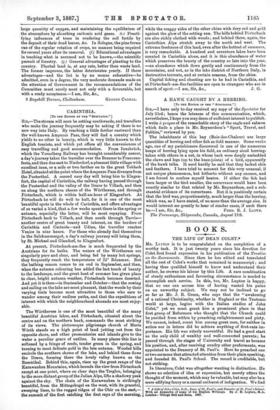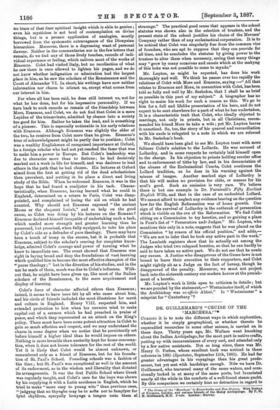BOOKS.
THE LIFE OF DEAN COLET.* Mn. LUPTON is to be congratulated on the completion of a worthy task. It is just twenty years since his devotion for Colet first found expression in his publication of the Treatise on the Sacraments. Since then he has edited and translated all the rest of Colet's works that remained in manuscript ; and having thus qualified himself to know and understand their author, he crowns his labour by this Life. A rare combination of eteady enthusiasm and favouring circumstance is needed to accomplish such service. In this, too, Mr. Lupton is happy, that no one can accuse him of having wasted his pains on an unworthy subject. We may not be inclined to go so far as Mr. J. R. Green, who says that the "awakening of a rational Christianity, whether in England or the Teutonin world at large, begins with the Italian studies of John Colet," yet we must grant him a prominent place in that first group of Reformers who thought that the Church could be purified from within by preaching enlightenment and piety. We cannot, indeed, count him among great men, for neither in action nor in letters did he achieve anything of first-rate im- portance. His life was utterly uneventful. He had a good start as the only child of wealthy and well-connected parents ; he passed through the stages of University and travel as became his position, and, after receiving sundry other preferments, was appointed to the Deanery of St. Paul's. Here he preached one or two sermons that attracted attention from their plain speaking, and founded St. Paul's School. The record is creditable, but not striking.
In literature, (inlet was altogether wanting in distinction. He shows no selection of idea or expression, but merely utters the thought of the moment, which may be valuable, but may also be a mere edifying fancy or a casual outburst of indignation. We find • A Life of John Colet, 1111, Dom of St. Paid's, and Pounder of St. Pours School. With an Appendix of sone of his English Writings. By J. H. Lepton, MA, London George Bell sad Bona, 18W.
no trace of that finer spiritual insight which is akin to genius ; even his mysticism is not bred of contemplation on divine things, but is a prosaic application of analogies, mostly borrowed from the systematic extravagance of the Dionysian hierarchies. Moreover, there is a depressing want of personal flavour. Neither in the commentaries nor in the few letters that remain, do we find any of those lively touches, records of indi- vidual experience or feeling, which enliven most of the works of Erasmus. Colet had visited Italy, but no recollection of what he saw there is once allowed to lighten his pages, and we do not know whether indignation or admiration had the largest place in him, as he saw the scholars of the Renaissance and the Court of Alexander VI. In short, his writings have now neither information nor charm to attract us, except what comes from our interest in him.
For when all has been said, he does still interest us, not for what he has done, but for his impressive personality. If we tarn back to such records as remain of the friendship between More, Erasmus, and Colet, we do not find that Colet is a mere Lapidus of the triumvirate, admitted by chance into a society too good for him. Rather he takes the lead, and is something of a pioneer. This is especially noticeable in his early relations with Erasmus. Although Erasmus was slightly the elder of the two, he receives from Colet more than he gives. Erasmne's tone of acknowledgment might be partly due to position; Colet was a wealthy Englishman of recognised importance at Oxford, he a foreign scholar who had not yet reached the fame that was to make him a power in Europe. But Cold's leadership was due to character more than to fortune; he had decisively marked out a work in life for himself, and was desirous to lead others in the path that he had chosen. His lectures at Oxford aimed from the first at getting rid of the dead scholasticism then prevalent, and putting in its place a direct and living Andy of the Bible. When he welcomed Erasmus, it was in the hope that he had found a coadjutor in his task. Charac- teristically, when Erasmus, having learned what he could in England,. determined on a return to Paris, Colet was disap- pointed, and complained of losing the aid on which he had counted. Why should not Erasmus expound "the ancient Moses or the eloquent Isaiah," and so help on the good cause, as Colet was doing by his lectures on the Romans P Erasmus declared himself incapable of undertaking such a task, which needed more strength and greater learning than he possessed, but promised, when fully equipped, to take his place by Colet's side as a defender of pure theology. There may have been a touch of irony in the excuse, but it is probable that Erasmus, subject to the scholar's craving for completer know- ledge, admired Colet's courage and power of turning what he knew to immediate use. The event showed that Erasmus was right in laying broad and deep the foundations of vast learning which qualified him to become the most effective champion of the 4` purer theology ; " but in the direction of his studies, and in the use he made of them, much was due to Colet's influence. With- out that, he might have been given up, like most of the Italian scholars of the Renaissance, to the mere acquirement and display of learning.
Colet's force of character affected others than Erasmus ; indeed, it seems to have been felt by all who cams about him, and his circle of friends included the most illustrious for merit and culture in England. Henry VIII. respected him, and extended protection to him when his enemies tried to make capital out of a sermon which he had preached in praise of peace, and which they represented as an attack on the King's policy. There mast have been some potent attraction in Colet to gain so much affection and respect, and we may understand the charm in some degree when we notice that he persistently set before himself a higher ideal than he would impose on others. Nothing is more loveable than austerity kept for home consump- tion, when it does not lessen tolerance for the rest of the world. Yet it is likely that Colet would be almost unknown, or remembered only as a friend of Erasmus, but for his founda- tion of St. Paul's SehooL Founding schools was a fashion of the time ; but St. Paul's was exceptional as well in the amount .of its endowment, as in the wisdom and liberality that dictated its arrangements. It was the first Public School where Greek was regularly taught, and Colet's care for the boys was shown by his supplying it with a Latin accidence in English, which he tried to make "more easy to young wits" than previous ones, " judgyng that no thynghe may be to softs nor to famylyer for lytel 0113'1th-en, specyally lernynge a tongue unto them al straunge." The practical good sense that appears in the school statutes was shown also in the selection of trustees, and the present state of the school justifies his choice of the Mercer's' Company rather than of any ecclesiastical corporation. It is to be noticed that (Joist was singularly free from the common vice of founders, who are apt to suppose that they can provide for all time, and he concludes the statutes by giving power to the trustees to alter them when necessary, seeing that many things may "grow by many occasions and °ands which at the makyng of this boke was not possible to come to mynde."
Mr. Lupton, as might be expected, has done his work thoroughly and well. We think he passes over too rapidly the
relations of Cold with More and Erasmus, saying All that relates to Erasmus and More, in connection with Colet, has been told so fully and well by Mr. Seebohm, that I shall be as brief as possible in this part of my subject." A biographer has no right to maim his work for such a reason as this. We go to him for a full and lifelike presentation of his hero, and do not expect to be sent elsewhere for a part of what be has undertaken. It is a characteristic trait that Wet, who ideally objected to marriage, not only in priests, but in all Christians, recom- mended his friend More to take a wile; yet Mr. Lupton leaves it unnoticed. So, too, the, story of his quarrel and reconciliation with his uncle is relegated to a note in which we are referred to Mr. Seebohm's book.
We should have been glad to see Mr. Lupton treat with more fullness Colet's relation to the Lollard& He was accused of Lollardry, and in some respects he certainly laid himself open to the charge. In his objection to priests holding secular office and to enforcement of tithe by law, and in his denunciation of the abuses of the Ecclesiastical Courts, Colet continues the Lollard tradition, as he does in his warning against the misuse of images. Another marked sign of Lollardry is that his will makes no provision for obits, or masses for his soars good. Such an omission is very rare. We believe there is but one example in Dr. Furnivall's _Fifty Earliest English Wilts, and that in the case of an undoubted Lollard. We cannot afford to neglect any evidence bearing on the question how far the English Reformation was of home growth. One sign of the survival of Lollardry is the outbreak of persecution which is visible on the eve of the Reformation. We find Colet sitting on a Commission to try heretics, and so gaining a place in Foxe's list of "Persecutors ands Judges." Mr. Lupton, who mentions this only in a note, suggests that he was placed on the Commission "by reason of his official position," and adds,— " We are not to infer that he took any active part in the work." The Lambeth registers show that he actually sat among the Judges who tried two relapsed heretics, so that he can hardly be said to have taken no active part. We do not see that he needs any excuse. A Justice who disapproves of the Game-laws is not bound to leave their execution to their supporters, and Cold might rightly sit as a Judge on the fact of heresy, though he disapproved of the penalty. Moreover, we must not project back into the sixteenth century oar modern horror at the punish- ment of a heretic.
Mr. Lupton's work is little open to criticism in details ; but we are puzzled by the statement,—" Westminster itself, of which the Archbishop was ac-officio Abbot." Is " Westminster " a misprint for " Canterbury "?



































 Previous page
Previous page